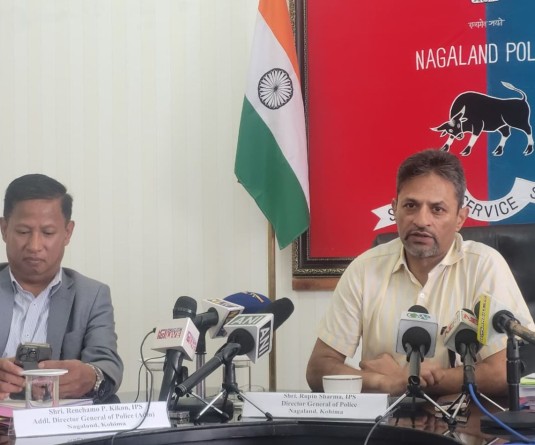V Lucas Meyase
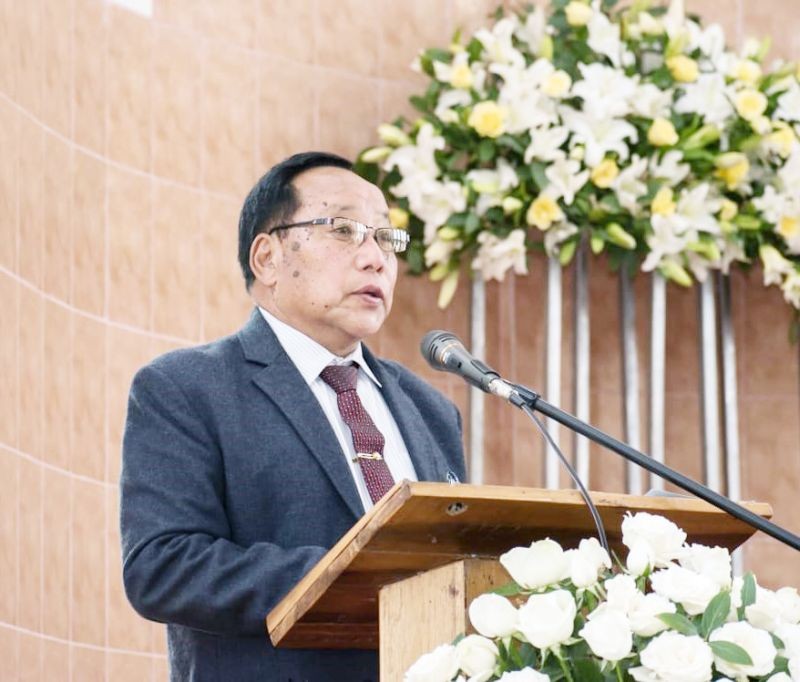

Morung Express News
Kohima | May 8
'Our callings are different, our gifts are different, our ability may also be different but each human being has a role to play'
V Lucas Meyase, who has been a preacher for the last 4 decades, firmly believes that everyone, both young and old, can live out their faith by performing well in whatever profession they are called to. “We may not do so much. Christ is not asking ‘how much you can do but how best you can do.’ God is asking us- how best you can contribute with the little you have,” he says.
In this exclusive interview with The Morung Express for the Beyond Pulpit series, V Lucas Meyase, who grew up with the desire to be a teacher/preacher, talks about his journey of spreading ‘The Good News’ as a young boy and how that has gone on to become his very way of life. He also believes that “work and eat” should be the characteristic of our youth today and that they must be alive spiritually, mentally and physically in order to live life to the fullest.
MExN: Can you tell our readers about yourself?
Meyase: I started schooling at the age of eleven because of the turmoil in Nagaland during the 1950s. Later, I taught in a school while simultaneously continuing my studies and graduated from Arts College, now called Kohima College. I joined government service as a clerical staff in the year 1979 and was trained in ‘Special Education’. I attended several other trainings in places like Delhi, Bangalore, Calcutta, Tura both in the field of education and religion. I retired as Director of School Education after 33 years of service.
As a child, I always wanted to become a teacher/preacher and by the grace of God, I could be in the profession by being inducted in the Department of School Education.
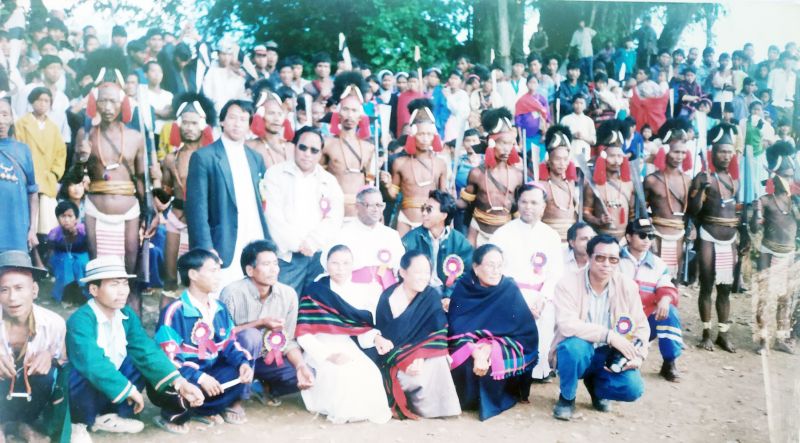
V Lucas Meyase with others in Arunachal Pradesh during the Arunachal Catholic Congress in the year 2000
MExN: How did you discover your calling to be a preacher?
Meyase: It will be too great a title to be called a ‘preacher.’ At best, you can call me a teacher. I can’t precisely say I discovered my calling at that time, day, month or year, but I believe it was God’s purpose that I got involved as a young boy while still in middle school.
We did not have a proper catechist in the village then, but since I could read and write/read the Bible, I served as a catechist in Khonoma while I was still in Class 6. By that time, I was already 17 years old since I started school late as most people of my generation did.
As a catechist, I led morning prayers, the Sunday liturgy, sang songs, and started preaching in the church. As somebody who could read and write, we felt it was our duty and that we must be in the forefront leading our people. In the absence of priests, I also presided over funerals. Whenever someone dies, all the catholic family, both young and old would gather and be with the bereaved family. Maybe some of those things led me to preaching.
MExN: As a young man you went around villages preaching the Good News. Tell us about your first experience as a preacher and what impact did it have on your spiritual journey.
Meyase: When I passed class IX in 1967 (by that time, I was 20 years old), the youth of our village made a program to go for village tour to spread the Good News. We went and preached in places like Ghaspani, Socünoma, Punglwa, Gaili—those villages were then not in the present location but were placed at the top of the hill. As the eldest and the most read in the group, comprising of about 20 young people, I would do the preaching.
Two things I vividly remember doing were- protecting the rights of the Catholics because those were the days, they were mocked and looked down by others, saying it was a foreign religion and not real. The other thing is we preached about ‘Christ who died for us in place of our roosters.’ For the Jews, it was the lamb, but in the Naga context, we would say, Christ came to save and cleanse us in place of our roosters.
Our people were so innocent during the 1960s and 1970s not to speak of the 1950s and 1940s. The experience was that none of them in the villages I mentioned were Catholics except for few of them in Socünoma and Ghaspani. As young as we were, we didn’t know how to preach except with our own Naga way of communication. However, we felt the need of spreading the experience we got from there and carried on.
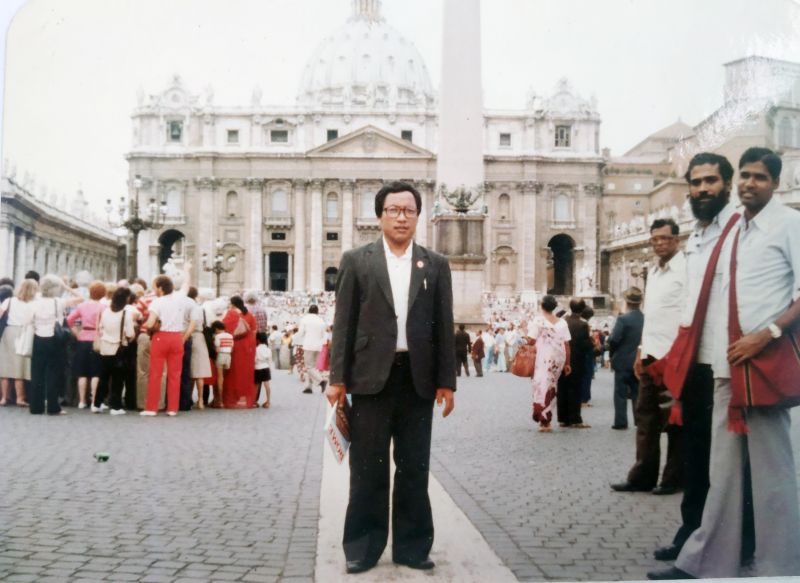
V Lucas Meyase at the St. Peter's Square in the Vatican City in 1983 during the Pilgramage to Holy Land
MExN: You held an important position as the Director of School Education. How did you balance work, family and ministry before your retirement?
Meyase: I have been speaking in conventions, retreats, seminars and conferences for about 40 years now some of which have become a regular feature like the Angami Catholic Youth Association (ACYA) or the Angami Catholic Women Association (ACWA). These congregations would include people of all age groups- young people, elders, women groups, etc.
Balancing work, family and reaching out was not so much of a challenge because the conferences I engaged myself in usually take place during weekends or the lean period of the year mostly in January and February.
When I became a senior officer, our people also know the responsibilities we have and they would extend invitation accordingly. But as a junior officer, there would always be conferences during the lean period and I would be invited to almost all the conferences stretching beyond boundaries and this has taken me to the Angami, Chakhesang, Mao, Lotha, and Rengma areas.
For me, winter season is generally almost booked for me. When I became older, I started preaching in Retreats as well, usually comprising of a group of about 40-60 people or 100 people at the most. I feel the effectiveness is felt more in these retreats or camps. This is where I feel the real changes take place. At the same time, huge gatherings are a manifestation of the glorification of our Mighty God.
At home, even in my absence, my wife perfectly takes care of everything and even if I have to sleep over for two nights in retreats or camps, we get by conveniently.
MExN: You have been involved in Bible translation from English to Tenyidie for the past few years. Can you briefly take us through this journey?
Meyase: I am in the ‘Review Team’. We have some translators, wherein each book of the Bible is assigned to them, which is then sent to the coordinator and forwarded to the Review Team comprising of 5-6 members. It is a very hazardous task, had it been any other book, it would have been okay if we are able to convey the idea. But with the Bible, we have to go word by word and we cannot whimsically change anything.
None of us are theologians and there are also priests to assist but they also don’t have the doctorate in theology. As priests, they all studied theology but they are not theologians. In other denominations, when they go for B.Div or B.Th, they are called theologians. But in ours, we must have a master’s degree in it. At best, they can be called students of theology.
It is a very difficult and hazardous task. Our translators would nicely translate but there are instances when some of them may understand in a different way. It has to be in consonance with our dialect and so, even for a single sentence, it can go on for hours. It’s been about three years now since we took up the task. Our people are also very anxious to have our own translation of the Bible but we don’t want to hurry to avoid making scandal to the Holy Word. We make a target of meeting once a week and when we do, we usually camp there together for 2-3 days reviewing the translated work.
MExN: What is the most rewarding part of being a preacher?
Meyase: Personally, I am just preparing the steps we are climbing to eternity because that is one of the wills of Jesus- to go and preach. I feel that I am doing this for myself and not for others. The reward is that we are just building. We may not do so much. Christ is not asking ‘how much you can do but how best you can do.’ We are crazy to go and reach for thousands and thousands but that won’t save us. God is asking us- how best you can contribute with the little you have. We are just preparing the steps.
Our human tendency is to go higher and higher and in this material world/life, the one who achieves it will be called a hero. But in the spiritual sense, one who achieves it will be called a saint. Our aim should be to go higher and higher in this respect.
When they nod or smile, we can know that they are admiring or taking in what we preach. The beauty we see is not only when the congregation is laughing, smiling or exhibiting joy but when they go to the extent of shedding tears maybe by recollecting past mistakes or a joyful moment. It is quite rewarding in being able to make someone happy- to see tears of joy maybe in repentance or recalling a big thing in life or the realisation of their life. Crying is also an expression of deep joy especially in retreats or camps. As a preacher, that is something that touches my heart too. When we see some of our participants feeling the need of shedding tears, and it is not always tears of sadness but can be tears of joy. It rewards and satisfies both.
MExN: What is the best part about being a Catholic?
Meyase: The most cherished part of being a Catholic is that I belong to the Universal Church which is founded by our own Lord Jesus; that church which is one, holy, catholic, apostolic. The beauty of being a catholic in my life is the ingredients of salvation- the Father, Son and Holy Spirit, which is greatly manifested by a true catholic especially revealing the sign of the cross.
Wherever I go, in any part of the world, we have the same liturgy, the same sign of the cross, the same way of kneeling, and the same sacrament. In 1983, I had the privilege to go for a Pilgrimage marking 2000 years of the Redemptive Work of Christ to Holy Land covering Italy and France. These are holy places in a catholic world. At that time, as a pilgrim, it was not so much about sightseeing but as a representative, we have to pray for our people- there were people from all across the globe. If we are singing or praying in one dialect, we understand each other, and what is going on in the altar.
That is the universality. We belong to the community of the universal church.
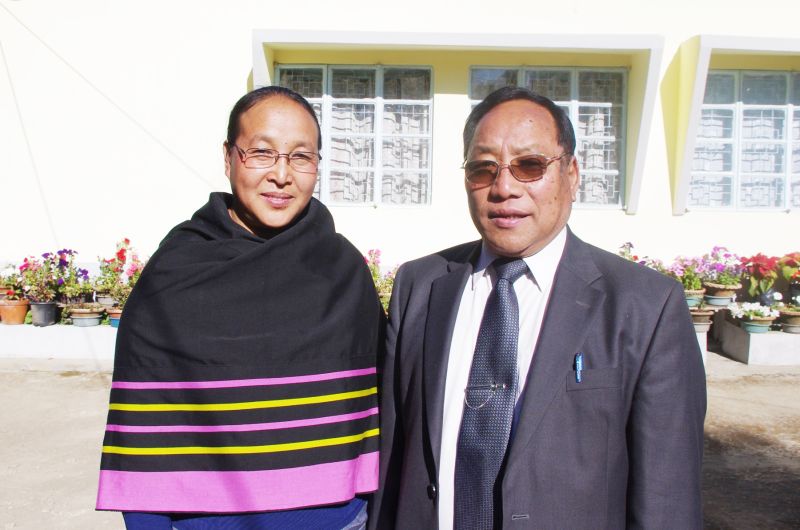
V Lucas Meyase with his wife
MExN: How can lay people live out their faith?
Meyase: Our callings are different, our gifts are different, our ability may also be different but each human being has a role to play. We are all called the common priesthood of Christ. In the life of this world, some are differently assigned- some are rulers, some are administrators, some are defenders, some are farmers- we are all called to our own profession. But everyone can give our own way of sacrifice.
Like a priest performing his sacrifice from the altar in a church, the altar for rulers is to plan and execute for the welfare of the people. The military has to defend their people, so that’s their altar. If they perform well, rulers plan well, and priests perform well, the county is safe and holy. The laities are maybe farmers, educationists, carpenters, masonries- whatever we are called for, we must use that as our altar. The role of lay people should not only be shouting social activities but even in spreading of the Gospel, they can contribute.
We have to re-evangelise the already convert people. We have to make a mechanic to reconvert those people- it doesn’t mean they have to be rebaptised but we have to live sacramentally. Otherwise, no amount of preaching will do.
MExN: In your observation, what are the challenges that young people of Nagaland face?
Meyase: Almost all our children are today qualified in the sense of attaining scholastic degree but there is unemployment at the same time. Many of our students are unemployable. The scarcity of posts is there but at the same time, we are lacking the culture of “work and eat”. That should be the characteristic of our youth. The youth must be alive and to be alive, they have to be spiritually, mentally and physically alive. When we have this ‘aliveness’ in our lives, we will know where to go, what to do, and we will have the sense of discipline, the sense of direction and the sense of responsibility.
MExN: Could you give us any final thoughts that you would love our readers to remember?
Meyase: Our society as a whole is in troubled times and it appears like we have lost our hope-like. The loss of hope is the disease of our society. When our hope is lost, that becomes the disease of the society giving birth to extortion, killing, etc. Greed is the seed of all sins and from there, it sprouts corruption, bribe giving, immortality, prostitution… we are living in such a generation but we have come to this life only once. We are passing this road only once and we can only make it worthwhile and memorable by avoiding the ills of the society.


